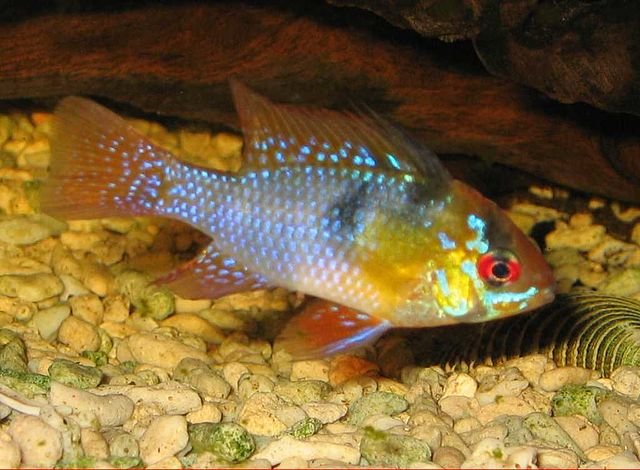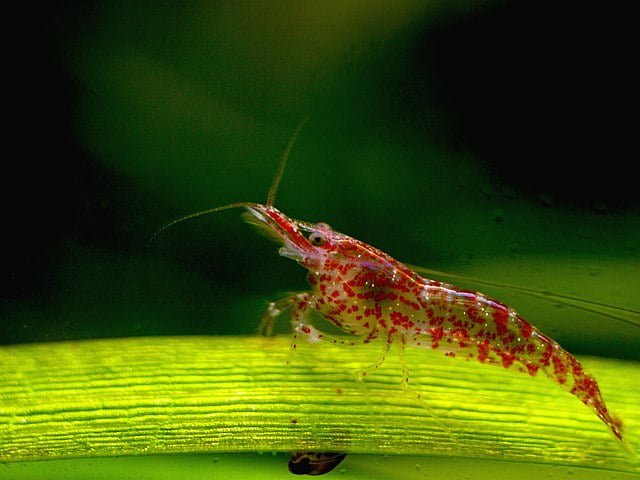Germany.- Fish experience stress, as do mammals and humans. When under stress, fish release the hormones adrenaline and cortisol. A team of scientists spearheaded by IGB has investigated whether flash photography induces an increase in cortisol levels of fish in aquariums. The good news: you need not worry about taking snapshots of the Ram cichlid.
It may be possible to read “Flash photography permitted!” on some display aquarium tanks in future. After all, the dazzling light of a camera flash does not induce stress in some fish species. IGB researcher Klaus Knopf teamed up with colleagues from the University of Girona in Spain and from SEA LIFE Berlin to investigate the response of the Ram cichlid (Mikrogeophagus ramirezi) to repeated camera flashlight over 14 days.
Among other things, the researchers determined levels of the stress hormone cortisol in fish. “The stress response triggered in fish is very similar to that in mammals and humans. Stress situations initially induce a surge of adrenaline in the blood stream within seconds. After a few minutes, cortisol is then released,” stated Klaus Knopf. Both hormones initially help the body to adapt to the stress situation in a number of ways: the heart rate rises, and blood flow to muscles and essential organs increases. If the stressor continues to be present, the organism is persistently on alert, which may have a negative impact on reproduction, growth and immune functions, for instance. “Our research group at IGB explores how stress can be avoided in fish farming and fish keeping – an important component of disease prevention ,” explained Knopf.
Directors of display aquariums and indeed some visitors are often anxious that flash lights may disturb and stress the fish. The results generated by the team of researchers, however, show the exact opposite in the case of the Ram cichlid: the values determined for cortisol and glucose (another stress parameter) were actually lower in fish exposed to flashes than their unexposed counterparts in the control group. The researchers also observed the behaviour of the fish for the duration of the study. The fish exposed to flashlight exhibited less aggressive behaviour in the form of lateral attacks and mouth-to-mouth contact than the unexposed fish. “It appears that camera flashes merely distract the fish somewhat, rather than having a negative impact on them. But this result cannot necessarily be transferred to all fish species,” stated Knopf. This is because different fish species populate habitats that have completely different light conditions.
Other species may have different responses to bright flashlights than the Ram cichlid. Several aquatic animals such as the octopus, for example, exhibit a startled response to flashlight. For the time being, there will be no changes to the photography restrictions at SEA LIFE Berlin. “In the past, we have asked our visitors to avoid using flash photography to take pictures of fish in the aquariums. But still, it happens time and again, so it is reassuring to know that it does not necessarily cause the creatures stress,” stated Martin Hansel from SEA LIFE Berlin.
Reference:
K. Knopf; K. Buschmann; M. Hansel; J. Radinger; W. Kloas (2018) Flash photography does not induce stress in the Ram cichlid Mikrogeophagus ramirezi (Myers &Harry, 1948) in aquaria. Journal of Applied Ichthyology. 34(2018)4, p. 922-928 https://onlinelibrary.wiley.com/doi/full/10.1111/jai.13673
Editor at the digital magazine AquaHoy. He holds a degree in Aquaculture Biology from the National University of Santa (UNS) and a Master’s degree in Science and Innovation Management from the Polytechnic University of Valencia, with postgraduate diplomas in Business Innovation and Innovation Management. He possesses extensive experience in the aquaculture and fisheries sector, having led the Fisheries Innovation Unit of the National Program for Innovation in Fisheries and Aquaculture (PNIPA). He has served as a senior consultant in technology watch, an innovation project formulator and advisor, and a lecturer at UNS. He is a member of the Peruvian College of Biologists and was recognized by the World Aquaculture Society (WAS) in 2016 for his contribution to aquaculture.







